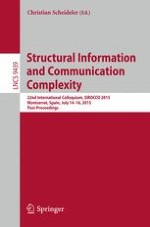2015 | OriginalPaper | Buchkapitel
A Fast Network-Decomposition Algorithm and Its Applications to Constant-Time Distributed Computation
(Extended Abstract)
verfasst von : Leonid Barenboim, Michael Elkin, Cyril Gavoille
Erschienen in: Structural Information and Communication Complexity
Aktivieren Sie unsere intelligente Suche, um passende Fachinhalte oder Patente zu finden.
Wählen Sie Textabschnitte aus um mit Künstlicher Intelligenz passenden Patente zu finden. powered by
Markieren Sie Textabschnitte, um KI-gestützt weitere passende Inhalte zu finden. powered by
A partition (
C
1
,
C
2
,...,
C
q
) of
G
= (
V
,
E
) into clusters of strong (respectively, weak) diameter
d
, such that the supergraph obtained by contracting each
C
i
is ℓ-colorable is called a strong (resp., weak) (
d
, ℓ)-network-decomposition. Network-decompositions were introduced in a seminal paper by Awerbuch, Goldberg, Luby and Plotkin in 1989. Awerbuch et al. showed that strong
$(exp\{O(\sqrt{ \log n \log \log n})\}$
,
$exp\{O(\sqrt{ \log n \log \log n})\})$
-network-decompositions can be computed in distributed deterministic time
$exp\{O(\sqrt{ \log n \log \log n})\}$
. Even more importantly, they demonstrated that network-decompositions can be used for a great variety of applications in the message-passing model of distributed computing. Much more recently Barenboim (2012) devised a distributed randomized constant-time algorithm for computing strong network decompositions with
d
=
O
(1). However, the parameter ℓ in his result is
O
(
n
1/2 +
ε
).
In this paper we drastically improve the result of Barenboim and devise a distributed randomized constant-time algorithm for computing strong (
O
(1),
O
(
n
ε
))-network-decompositions. As a corollary we derive a constant-time randomized
O
(
n
ε
)-approximation algorithm for the distributed minimum coloring problem. This improves the best previously-known
O
(
n
1/2 +
ε
) approximation guarantee. We also derive other improved distributed algorithms for a variety of problems.
Most notably, for the extremely well-studied distributed minimum dominating set problem currently there is no known deterministic polylogarithmic -time algorithm. We devise a
deterministic
polylogarithmic-time approximation algorithm for this problem, addressing an open problem of Lenzen and Wattenhofer (2010).
